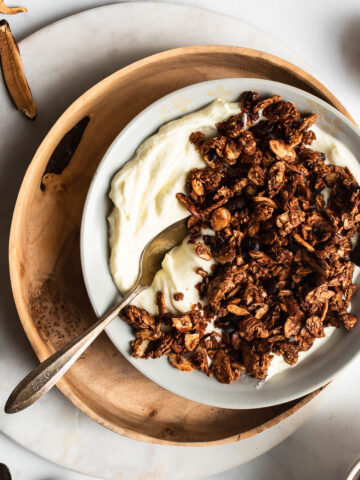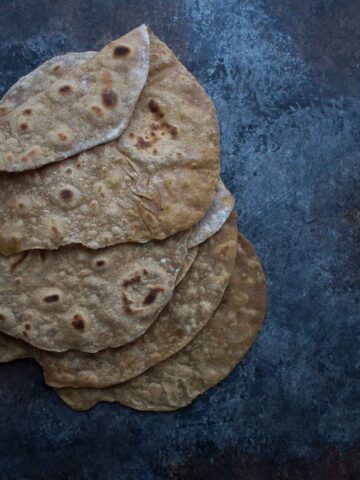This fruit- and honey-sweetened quinoa granola is an easy win for breakfast. You can make a big batch of it to store in a jar in the cupboard and serve it with homemade yogurt or kefir for a quick, easy breakfast.
Quinoa granola is also a fantastic early food for toddlers, as it is relatively easy for little bellies to digest, and it's a good source of magnesium and bone-building phosphorus.
Jump to Recipe






Domi says
Hi, I am joining the question about fruit - do I add it before dehydrating or after? Kind regards
Laura says
It doesn't specify if the quinoa is cooked before use.
Could you let us know, please?
Jenny says
Hi Laura,
If the quinoa were cooked, it would be specified in the instructions.
Lindsey says
Is it possible to use almond flour in place of coconut flour?
Jenny says
You could try and let us know how it works .
Fiona Chain says
Hi Jenny
I make a simple muesli of toasted oats and nuts every second week and enjoy it daily for breakfast (it's the main reason I get up early-to enjoy a leisurely breakfast) but this one sounds just wonderful, more nutritious and I think it would be totally delicious too. Thanks for the recipe and have a lovely day.
Fi
Ami says
Do I add the fruit before dehydrating or is it for serving after the granola is dry?
LucyRose says
re: honey and toddlers - I thought honey was generally considered unsafe, even in recipes, for children 18 mos and under? see: wholesomebabyfood.momtastic.com/infantbotulismhoney.htm
Jenny says
Hi Lucy,
No, that's incorrect information. Honey can be safely fed to babies 12+ months old, according to the AAP. The risk of infant botulism at 12+ months is unheard of.
http://www.aappublications.org/content/32/12/32.5
Lisa says
Do u dehydrate the fruit or leave it raw ?
Thank you do much
DebbieP says
Just confirming: the quinoa is never cooked, just soaked and dehydrated, correct?
Susan says
This granola sounds great for people at the opposite end of life from babyhood, too. I am really glad to see you address the issue of introducing children to real, interesting food at a young age. My husband has two sons, each of whom has two sons. The children of the younger son like all sorts of "strange" foods and are fine with trying new things. The children of the older son were apparently raised on "kid food", and the older one (who is almost 15) is still afraid - literally - of what I call real food, as is his younger brother. That still boggles my mind. How does one change the tastes of a child like that so that they can survive in the real adult world?